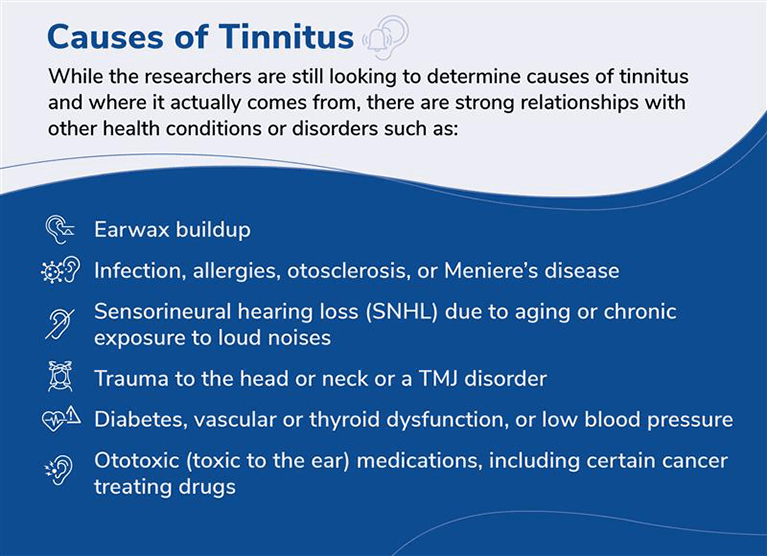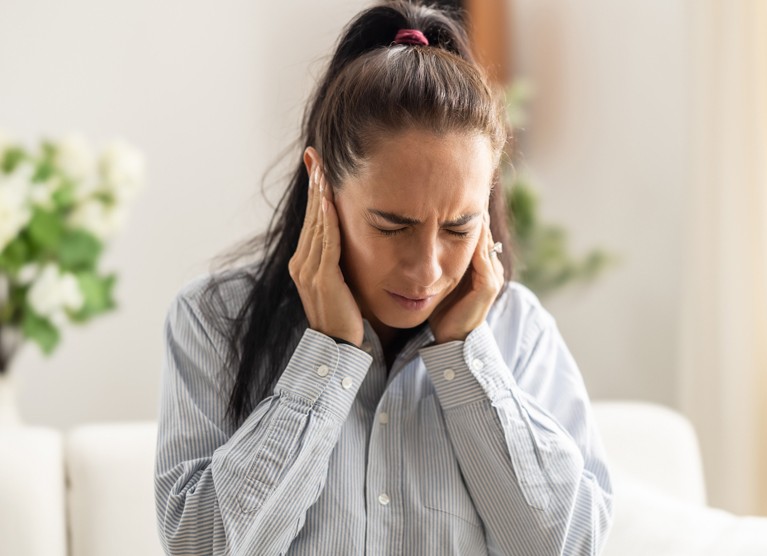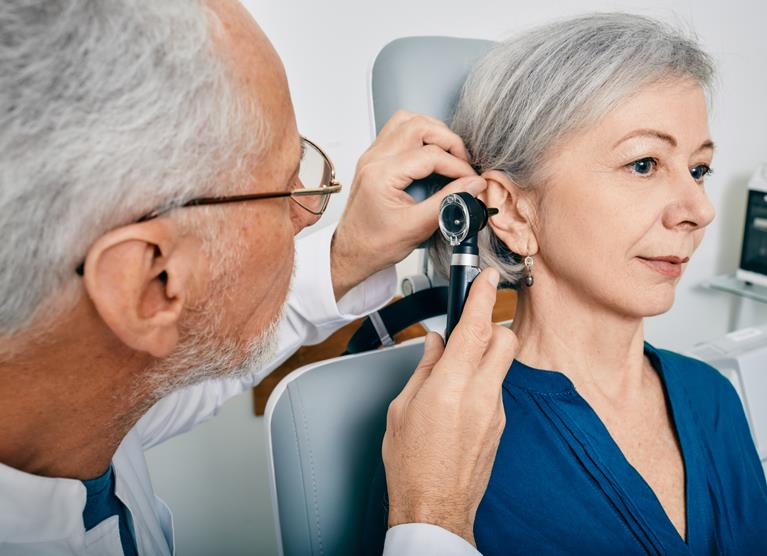What Can Cause A Swishing Sound in Your Ear?
It is estimated that 50 million Americans suffer from tinnitus, a condition that manifests as a persistent ringing, whooshing, or swishing sound in the ear.
Because the sound originates from inside the ear, people with tinnitus may feel like an ocean is roaring inside their head. If you want an idea of what a person with tinnitus hears, check the American Tinnitus Association’s “Sounds of Tinnitus.”
The ringing you may hear after a concert is an example of temporary (short-term) tinnitus. But for millions, the condition is chronic. Tinnitus is quite common in people over age 55 and is a strong indicator of hearing loss for many.

Causes of Tinnitus
Researchers are still investigating the exact origins of tinnitus, but the condition is strongly associated with a variety of health issues and exposures, including:
- Ear canal problems: Earwax buildup, a perforated eardrum, or something touching the eardrum.
- Middle-ear conditions: Infection, allergies, otosclerosis, Meniere’s disease, or tumors in the middle ear.
- Sensorineural hearing loss (SNHL): Due to chronic exposure to loud noise or age-related changes.
- Trauma and musculoskeletal issues: Head or neck trauma, neck misalignment, or TMJ disorder.
- Systemic conditions: Diabetes, vascular disorders, thyroid dysfunction, or low blood pressure.
- Ototoxic medications: Certain anti-inflammatory drugs, some antidepressants, sedatives, and aminoglycoside antibiotics (the “mycin” family).
- Cancer drugs: Certain chemotherapy agents, especially cisplatin and carboplatin.
In some people, consumption of alcohol, caffeine, or medicines containing salicylates (such as ibuprofen or some antacids) can significantly worsen tinnitus symptoms.
Many tinnitus patients also have hearing loss, but a ringing or swishing sound in the ear does not always mean you are losing your hearing.

What Should You Do If You Have Tinnitus?
The first step is to see your primary care physician. They will check for excess earwax, review medications, and rule out medical causes. An ENT (ear, nose, and throat) specialist can examine your head, neck, and ears and perform hearing tests to determine whether hearing loss accompanies tinnitus. If needed, an audiologist may perform further testing to evaluate the extent of both hearing loss and tinnitus.
Is There a Cure for Tinnitus?
There is no single cure for tinnitus, but it can often be effectively managed. Working with a hearing care professional (HCP) lets you develop a personalized treatment plan. Advanced hearing-aid technology, combined with expert guidance from an HCP, can help you cope with persistent tinnitus.
For people with both hearing loss and tinnitus, improving hearing can relieve tinnitus symptoms: according to the Better Hearing Institute, up to 60% of hearing-aid users reported at least some relief from tinnitus after using hearing aids to improve their hearing.

Practical Steps to Improve Coping and Well‑Being
- Follow professional guidance: Work with your PCP, ENT, and audiologist to identify causes and tailor treatment.
- Consider hearing technology: Hearing aids and sound-masking devices can reduce the perceived loudness or intrusiveness of tinnitus.
- Address contributing factors: Treat ear infections, manage chronic health conditions, and review medications with your provider.
- Adopt healthy habits: Relaxation techniques, regular exercise, adequate sleep, and a balanced diet can improve overall tolerance and resilience.
- Avoid aggravating substances: Limit alcohol, caffeine, and salicylate-containing medications if they worsen your symptoms (after consulting your provider).
If you experience sudden or severe tinnitus, or if tinnitus is accompanied by sudden hearing loss, dizziness, or neurological symptoms, seek medical attention promptly.

Take Online Hearing Test
Take our free at-home hearing loss test as a first step on your journey to better hearing.

Book Your Free Appointment

Reviewed By
Kathy McGowan, AuD CCC-A, Doctor of Audiology
Kathy McGowan is the Manager of Managed Care Programs with Beltone Corporation . Kathy worked with the Professional Development Training Team as well as the Operations Team and Beltone Corporate Retail for 8 years before being promoted to her current position. Prior to joining Beltone Corporate, Kathy worked for 10 years as an Audiology Manager in a private practice. She has worked in many settings as an Audiologist including an ENT practice, a hospital, an Optical and Hearing Company, and in the Military, retiring as a LtCol. Kathy earned her Bachelor’s in Speech and Hearing and Master’s in Audiology from Ohio University in Athens, Ohio, and went on to receive her Audiology Doctorate from A.T. Still University School of Health Sciences. Kathy is currently licensed in seven states.

